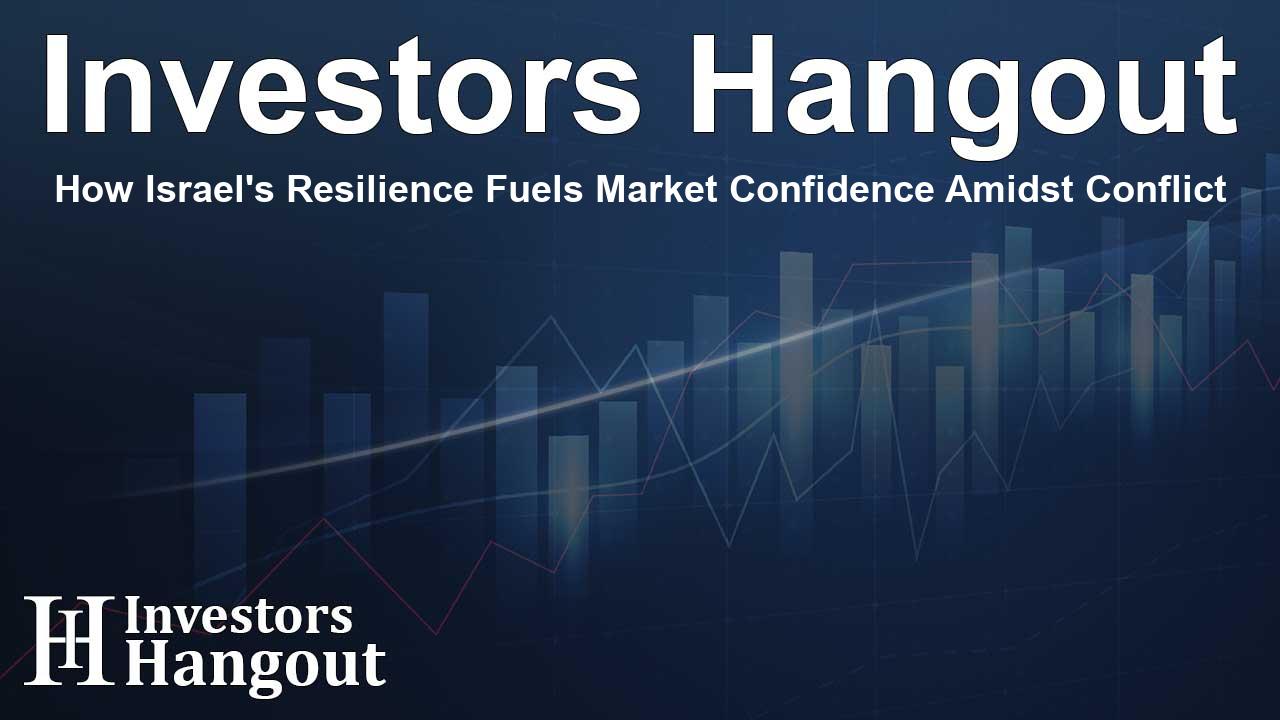How Israel's Resilience Fuels Market Confidence Amidst Conflict

How Israel's Resilience Fuels Market Confidence
In a world where uncertainty often prevails, the Israeli market's resilience shines through, offering insights into how conflicts can shape economic landscapes. Understanding the dynamics of Israel's economy is vital as we assess its prospects following recent tensions in the region.
Economic Stability in Turbulent Times
Israel has demonstrated a remarkable ability to maintain economic stability, even amidst chaos. The strength of the Israeli economy is reflected in its impressive performance, which has sparked intrigue among global investors looking for opportunities in volatile environments.
Insights from Economic Leaders
Israeli Minister of Economic Affairs has highlighted the nation's economic fortitude. In interviews, he asserts that Israel not only survives conflicts but emerges stronger. This perspective is backed by historical data, showing how the nation has consistently fortified its economy during and after crises.
The Tel Aviv Index: A Strong Rebound
The Tel Aviv 125 index serves as a barometer for the market's health. Following recent events, a notable rebound reflected in the index speaks volumes about investor confidence. Emerging from an initial drop of over 13%, the index showcases a robust recovery, indicating a potential for renewed growth as hostilities cease.
Demographics Supporting Growth
Understanding Israel's unique demographic trends helps explain its economic resilience. Unlike many developed nations facing population stagnation, Israel boasts a youthful and dynamic population that actively contributes to its diverse economy, emphasizing innovation and entrepreneurship.
Navigating Geopolitical Risks
Investors often weigh the inherent risks associated with geopolitical instability. However, as tensions subside, a shift in sentiment towards Israel's markets may occur, providing fertile ground for investment. The long-standing investment paradox — where challenges can be transformed into opportunities — highlights the historical context of Israel's economic journey.
Advantages of the Technology Sector
The technology sector, often referred to as the backbone of Israel's economy, plays a crucial role in fostering growth. With startups blooming and innovation thriving, this sector significantly contributes to economic output, making Israel a formidable player on the global stage.
Natural Resources and Wealth Generation
Israel’s natural gas reserves have expanded significantly over the past decade, bolstering the country's fiscal landscape. The development of a sovereign wealth fund to manage these resources allows for long-term growth strategies, ensuring that revenues are channeled into productive avenues.
Investment Trends on the Horizon
Despite the ongoing regional turmoil, many investors have overlooked Israel. The upcoming transition of the Tel Aviv Stock Exchange to a traditional trading week could open doors to more international capital. This shift may enhance foreign investment, further stabilizing the economic landscape.
The Future Outlook for the Israeli Economy
As global markets adjust to evolving conditions, Israel stands poised for a promising future. The anticipated strength in GDP growth projected by various economic organizations reflects optimism in the nation’s recovery. The combination of historical resilience and forward-thinking policies sets the stage for sustainable growth.
Conclusion: Embracing Challenges
This story of resilience lies at the heart of Israel's economic identity. As the nation navigates through complexities, it exemplifies how adversity can fuel innovation and opportunity, encouraging potential investors to consider the possibilities that lie within. The trajectory suggests that Israel's capacity to adapt may lead not just to recovery but to a revitalization of its economic landscape.
Frequently Asked Questions
What are the main drivers of Israel's economic resilience?
Israel's economic resilience stems from its robust technology sector, demographic advantages, and history of overcoming conflicts, which has shown that it can emerge stronger.
How has the Tel Aviv 125 index performed recently?
After experiencing a drop due to conflicts, the Tel Aviv 125 index has rebounded significantly, illustrating strong recovery and renewed investor confidence.
What shifts are expected in Israel's trading practices?
In 2026, the Tel Aviv Stock Exchange will shift to a Monday-through-Friday trading week, potentially attracting increased international investment.
How does Israel's technology sector impact its economy?
The technology sector is vital, contributing significantly to Israel's GDP and international reputation as a leader in innovation and entrepreneurship.
What potential should investors consider regarding Israel?
Investors should recognize the opportunities that arise from Israel's historical resilience in the face of adversity and its commitment to growth amid geopolitical challenges.
About The Author
Contact Lucas Young privately here. Or send an email with ATTN: Lucas Young as the subject to contact@investorshangout.com.
About Investors Hangout
Investors Hangout is a leading online stock forum for financial discussion and learning, offering a wide range of free tools and resources. It draws in traders of all levels, who exchange market knowledge, investigate trading tactics, and keep an eye on industry developments in real time. Featuring financial articles, stock message boards, quotes, charts, company profiles, and live news updates. Through cooperative learning and a wealth of informational resources, it helps users from novices creating their first portfolios to experts honing their techniques. Join Investors Hangout today: https://investorshangout.com/
The content of this article is based on factual, publicly available information and does not represent legal, financial, or investment advice. Investors Hangout does not offer financial advice, and the author is not a licensed financial advisor. Consult a qualified advisor before making any financial or investment decisions based on this article. This article should not be considered advice to purchase, sell, or hold any securities or other investments. If any of the material provided here is inaccurate, please contact us for corrections.
